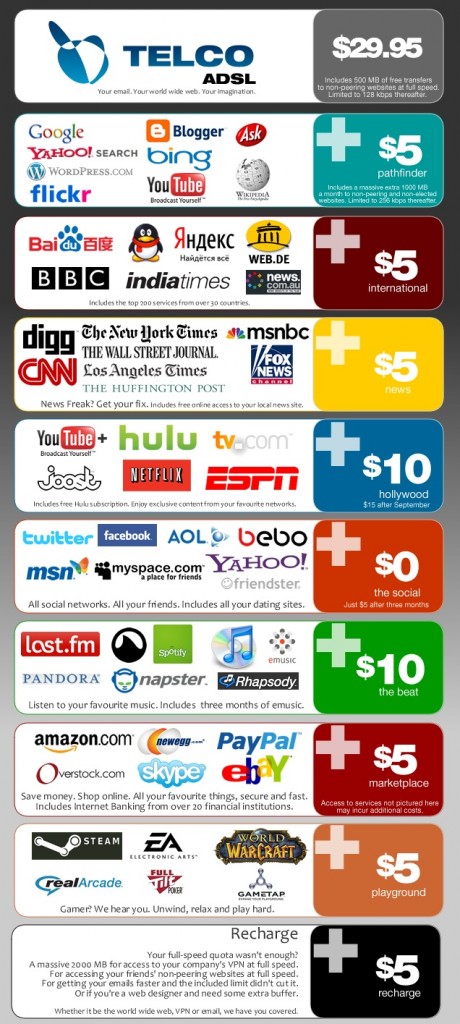
Shaw's flyer distributed to Novus customers
The Supreme Court of British Columbia has thrown out Novus Entertainment’s 2009 lawsuit against Shaw Cable accusing western Canada’s largest cable operator of predatory pricing and other anti-competitive acts.
Last summer, Stop the Cap! gave considerable attention to the price war that broke out between Novus Entertainment, a fiber provider serving many Vancouver apartment buildings and condos vs. incumbent cable provider Shaw Cable.
Novus, which entered the BC market well after Shaw, faced what it alleged were incidents of fixing prices below cost and false advertising in an effort to drive competition out of the market.
At one point, last summer’s battle dropped prices as low as $30 a month for a package of HD cable, unlimited phone, and 16Mbps broadband service from Shaw. Novus accused Shaw of recouping their losses in Vancouver from other Shaw cable subscribers across Canada who made up the difference with higher cable rates.
Novus sought relief before The Honourable Mr. Justice Greyell, in the Supreme Court of British Columbia. Novus argued that under the recently expanded Competition Act, the court could order Shaw to cease unfair competition and face punitive fines for the cable company’s bad behavior.
Novus recited details of the price war:
Commencing February 2009, Shaw began a series of marketing campaigns specifically targeted at Novus’ existing customers in high-rise, multiple-dwelling units (“MDUs”) developments in Vancouver and Burnaby, British Columbia.
In February 2009, Shaw offered very low pricing on its Cable Television Services, Internet, and digital telephone services to certain Novus customers. Customers were free to take one, two or all three of the services offered. There were no contracts or commitments required:
- Cable Television Services: Shaw’s “High-Definition TV” package including over 100 digital and HD channels, plus 1 year free rental of a high-definition personal video recorder (“HDPVR”), free for the first two months, and $9.95 for the next ten months (twelve months in total).
- Digital Telephone: Shaw’s “Digital Phone Basic” package, which includes local calling and call display, free for the first two months, and $14.95 for the next ten months (twelve months in total).
- High-speed Internet: Shaw’s “Xtreme-I Internet” package, free for the first two months, and $19.95 for the next ten months (twelve months in total).
In March 2009, Shaw began offering a free HPDVR to keep, plus the first month of service for free, to customers that switch back to Shaw. Customers were only required to commit to six months of pre-authorized payments.
In July 2009, Shaw offered even lower pricing than it marketed in February:
- Cable Television Services: More than 200 digital channels, including all analogue and digital television channels, 25 high-definition television (“HDTV”) channels, a movie channel package, plus two rental HDTV set-top boxes with personal video recorder (“HPDVR”), free for the first two months, and $9.95 for the next ten months (twelve months in total).
- Digital Telephone: Shaw’s “Digital Phone” package, including local telephone service, over a dozen calling features including voicemail, call display and call waiting, unlimited calling within Canada and the US, 1,000 International minutes to selected countries per month,”) free for the first two months, and $9.95 for the next ten months (twelve months in total).
- Shaw’s “Xtreme-I” high-speed Internet: with advertised download speeds of up to 16 Mbps, “Powerboost”, 10 personal email addresses and 100 GB monthly data transfer”), free for the first two months, and $9.95 for the next ten months (twelve months in total).
 To add insult to injury, according to Novus, Shaw began advertising Internet “now 50 percent faster.” In Novus’ opinion, the advertising implied Shaw’s Internet service was now 50 percent faster than broadband offered by Novus.
To add insult to injury, according to Novus, Shaw began advertising Internet “now 50 percent faster.” In Novus’ opinion, the advertising implied Shaw’s Internet service was now 50 percent faster than broadband offered by Novus.
The text from Shaw’s ad read:
Feel the need for extra speed? Shaw high-speed Internet is now 50% faster that’s fast. Downloading your favourite music, videogames, and movies will take no time at all. Plus Shaw high-speed Internet comes loaded with no cost extras like Powerboost, Shaw Secure and much more. Get Shaw high-speed Internet for the amazing new price of only $19.95 per month for the first three months including modem and installation. There’s never been a better time to order. Call 310-Shaw today.

Signs sponsored by Shaw Cable were placed in front of buildings wired by Novus
The decision by Mr. Justice Greyell was carefully watched across Canada as it represented the first test of expanded authority granted by Parliament for courts to impose significant monetary fines against bad actors. Commentators noted the new authority theoretically granted courts the power to determine anti-competitive activity itself — a power formerly held by Canada’s Competition Tribunal.
Those commentators need not have worried if the BC Supreme Court decision stands intact.
Mr. Justice Greyell dismissed Novus’ claims and ruled that in the absence of a determination of anti-competitive behavior by the Competition Tribunal, the court had no right to declare Shaw guilty of such behavior in the case.
“I conclude that in the absence of an order from the [Competition] Tribunal under s. 79 of the [Competition] Act, those portions of the statement of claim alleging a breach of s. 79 of the Act be struck out,” the chief justice ruled, effectively dismissing Novus’ anti-competitive claims against Shaw.
Mr. Justice Greyell also was unconvinced consumers would be confused by Shaw’s “50 percent faster” advertisement, believing the cable company now delivered faster service than Novus.
“In applying these tests to the ‘Now 50% Faster’ advertisement I am unable to conclude a reasonable person would view the words used as referring to the plaintiff’s business. I am of the view the interpretation any reasonable person would place on the words is that Shaw is directing the advertisement to its own customers, and anyone else who might be interested, that its services are 50% faster than they used to be. This fact is made clear by Shaw’s use of the word ‘Now’ – which implies that in the past Shaw’s services were slower and that Shaw has ‘Now’ improved the speed of its services The advertisement makes no reference to Novus or to any Shaw competitor,” the chief justice ruled.
Novus effectively walks away from the BC Supreme Court empty-handed, and a little lighter in the wallet. The chief justice also ruled Novus is responsible for Shaw’s legal bills associated with defending itself against Novus’ lawsuit.
[flv width=”630″ height=”375″]http://www.phillipdampier.com/video/Novus – 10 Bucks Too.flv[/flv]
Novus released this video as part of an outreach campaign arguing cable customers across western Canada should qualify for the same incredibly low promotional pricing Vancouver residents pay for Shaw Cable. (2 minutes)

 It’s a key flaw many state legislators fail to recognize when accepting the phone company’s argument that deregulation will save consumers money. Documentary evidence suggests the reverse is true, especially in areas not well covered by cable and wireless competition. Those choosing the most basic levels of service typically face the largest rate hikes as telecommunications companies try to drive customers into multi-service bundles often approaching $200 a month.
It’s a key flaw many state legislators fail to recognize when accepting the phone company’s argument that deregulation will save consumers money. Documentary evidence suggests the reverse is true, especially in areas not well covered by cable and wireless competition. Those choosing the most basic levels of service typically face the largest rate hikes as telecommunications companies try to drive customers into multi-service bundles often approaching $200 a month.

 Subscribe
Subscribe




